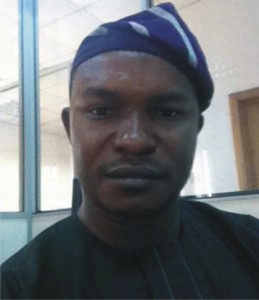
Mr. Solomon Chukwu is the Chief Executive Officer (CEO) of Solochus Group of Companies. They are one of the waste management companies lincensed by the Lagos State Government. In this chat with MMS plus Weekly, he shares his challenges as a waste collector and how it has improved his financial fortunes. Waste business is a serious business, he said. Excerpts:
Who is Solo Chuks?

Solochus is Mr. Solomon Sunday Chukwu, that is the name behind Solochus Group of companies.
When did you get into waste management as a career and how has it been?

Waste management business for me I will not say is by accident but I found myself in it. It came at a time when it was not like a business in Nigeria. We were among the pioneers, those who started the business. I saw the advert on TV, on papers and it came to my mind that this could be a good business, afterall in my house I pay for refuse collection and if I can package myself in a way that can convince them to pay money after I must have serviced them that I will be making money out of it. That was how I decided to go to Alausa and get licensed to do the job.
I was among the few that started the business in 1999.
Do you get paid for the service rendered by the people or the government?
Yes. When we started in 1999, we go to houses, we canvass them like the normal marketing. You market them, you appeal to them that we are not asking for money upfront. We are not like PHCN that will collect money for service not rendered.
But we render service after rendering the service to your own satisfaction, you pay us.
Then, they was no law backing us like today, like there is a clause in the Environmental Law in Lagos State that you must use certain kind of waste collector. Then, we were competing with truck pushers. It was out of the zeal and determination that you have to go out there and market yourself.
How would you describe the reception then, did people really embrace it?
No. I could remember in those days, in some areas that we went to market in Ajao Estate, the people were asking us “is PSP a political party? PSP is Private Sector Participation (PSP) in waste management. This PSP was introduced by the last Military Governor of Lagos State, Gen. Buba Maruwa. As at that time there were trying to see if it will work and as at that time there was no law backing it. It was just to license you if you are interested in doing the business and some of us took it.
As at that time, it was not really encouraging but what kept people like me going is that every month, I kept getting more clients and as these clients kept increasing, that time it was like using our money. We were not breaking even but there was hope because the clients kept increasing. When the civilian government came on board it was like they saw it as an option. Option in the sense that the cab pusher will collect the waste from your house go to a near by drainage and dispose it there. But the PSP operator licensed and monitored by the government , we also use vehicle.
We will always transport our own to the designated dump site. The government had no option but to make a law that will make it compulsory for every Lagosian to use PSP operator. So, I will say that today is better than yesterday.
So far, are they challenges you face in the course of doing this business?
When we started they were some operators who were not regulated, not organized, they collect from your house, go to the nearby drainage and dump it. They pick it up and dump it by the road side. They can come to your door step as early as 5am. We can’t come that early. Those were some of the challenges then. But today the challenges are different from what we faced then.
Today, we are more like a monopoly, we are the only one doing the job, in my own area I don’t know of other part of Lagos. In some areas, the cart pushers are still available, where the PSPs are not forth- coming people have to look for a way to dispose their waste because waste is like having a piece of wool in your skin. You will never feel comfortable until it is removed.That is how it is with waste. Nobody wants to stay with waste. Whatever means you would want to dispose it, If you are not there they will look for a way to do so.
In my own area there is a PSP assigned but the challenge we have in my area now is the government. The dump site is inadequate, the population keeps increasing. More of communal dump sites should be allocated because government dump site is not enough to accommodate the volume of waste that come from houses and industries.
Another challenge is payment and tenement. You know, we are not used to the culture of paying for services in this part of the world. As am talking to you, they are still some people owing us for up to two years for services they have enjoyed. So payment is another challenge we have but like I said it is peculiar to waste management. Any other challenge is what every other person in the country experience, like the road and the rest.
In order words, are you into partnership with Lagos state in this sewage management in line with what the government is doing in the state?
All over the world, private sector participation, franchising has been the option to every utility. Private sector come into invest in it while the government will be there to regulate how the services will be carried out. So, is more like a franchise. They franchise certain areas for you to collect the waste and transport to government dump sites. The government has the sole responsibility of managing the dump site while collecting the waste is the sole responsibility of the franchised operators.
Certain area is franchised to a particular operator so that they can monitor it to know whatever goes on there. For instance, I operate in Agege. I cannot go Festac to pick waste even if I have all it takes to handle the kind of waste produced in that area. And that is because that area is not franchised to me. So if somebody calls from Festac to complain that his or her waste has not collected for some time, they will quickly look up who is assigned to that area, who is supposed to be picking waste in that area and that is the model we are using in Lagos State now.
Do you pay for the dumping site?
For now, know.
Do you think the government might come up with something like that in the future?
Yes. Recently about three Trans Loading Site (TLS) were commissioned and privatized as well. Those that dump there pay a token for the maintenance of those TLS. The managers of those TLS have this long trailers that can carry up to 4-5 load of compactor trucks and by so doing they decongest the dump site and that is the style they have adopted in certain areas now. They have one in Agege, one in Oshodi.
What is your take on pollution management within Lagos metropolis?
Pollution management, all over the word is a collective responsibility, both the government and the public. The government has to come up with some policies and then monitor those policies and enforce them. For instance, sachet water, you drink it and throw it away. As much as I know it will take hundreds of years for Nylon to decay, if at all it will. That on itself is pollution.
In other part of the world where they have imbibed the culture of waste and pollution management, they sort their waste from the house. It is not the same garbage straw that collects paper that will collect food remnant, metal, bottles and the rest. Here we are not there yet.
They just dump everything in one bag and dispose through one medium because the nylon will never decay, neither the bottle if u put them together they will be conflict within themselves and that can lead to any thing. So in pollution management all hands are needed to do the work.
The public need to sort their waste, to sort the nylon, paper and food remnant and vegetable waste to their different recycling line where they will be recycled. The fact remains that we are not there yet. We need everybody to imbibe the culture so that it will work.
Government needs to build more modern dump sites that can accommodate more trucks of waste. Dump sites where people can go in and dispose the waste and come out as soon as possible, increase the number of TLS. With my experience over the years in this business I know that dump sites during raining season is difficult to access, that as well can slow the pace at which people go back to collect waste from the communities where they are assigned to do the work. If possible, in every local government construct a TLS, at least 2hectres of land is enough to build TLS.
Another thing I observed is that people still don’t want to pay for waste, believing that if they don’t give you the waste you cannot force them to pay you. Those kind of people when it rains they will dump it in the drainage or by the road side. Government should be more involved in enlightening those who evade paying for waste disposal. They should be enlightened on why they should pay.
I will not advocate that government should pay for everything and they should be a law that would compel the people to have at least two or three waste bags: One for paper, one for plastic and one for metal, etc. By so doing, recycling or collecting the waste material will be easier for you. With this managing the dump site becomes easier.
Are you into Recycling too?
For now, no. It is the secondary stage of waste management. For now, is mainly the government that is into it except for few companies that have ventured into it. For me as a person, if I must do it, I will need government license because it is capital intensive and the way those who are into it are doing it now, is not regulated. At the end of the day it becomes pollution on its own.
Recycling has not come to the point where if am investing in it, I will have it in mind that I will be in it for the next ten to fifteen years.
Are you saying that those in it now are not licensed?
Well, they could be licensed but not organized. Government is working on things and I believe that with time it will come to be. There are few recycling plants around. At least, I know of those that recycle nylon, and paper even those that scavenge metal too. Wahoom is a recycling plant where they recycle metals.
Do you intend to go into Recycling in the future?
Definitely. We are already in the business for over fifteen years and am not in a hurry to leave the business but we have to wait for when the environment becomes ripe and better to launch out.
In spite of the challenges mentioned earlier, how has this business paid off for you as a business man?
In life you cannot say because you are not paid what they pay in Chevron or Shell that the work is not worth doing. Those who work in Chevron are being paid higher than those that work in WAMCO or Nigerian Breweries; but in all, everybody can still afford to change clothes and take care of their basic needs and that is how I look at it.
In spite of the challenges, we are still breaking even. At least, about 80% percent of our clients are responding and it is something to fall back at and do hope that some day 100% percent will respond. Fifteen years is not five days if is not ok, am not a slave, I would have backed out. It is a good business.
Is there any kind of encouragement from the government, so far?
Yes, there is. I must commend Lagos State Government. Recently, about two years ago, they bought new trucks, about 100 compactors that were given to waste managers to pay intalmentaly. They bought those trucks from TATA. From the open market it will cost over N12million but was given to PSP operators to pay in bits. It was financed by a commercial bank but Lagos State stood as the guarantor. I think that is a good encouragement.
What is your relationship with the regulatory agencies in waste management?
Mostly, we deal with the Ministry of Environment (MOE) and LAWMA. So far, so good, the relationship has been cordial.
Are you recognized by MOE?
Yes. They licensed us which means the recognize us.
Like the Lagos State government, any form of support from the Ministry of Environment?
They do organize seminars and workshops where they invite experts from outside the country to give us lectures on the best practices and I know that the cost of those workshops and seminars are on them. They train and retrain us on the best practices on waste management.
What will you say are your achievement with this business?
I have achieved a lot. I became a waste manager in less than 25years. When I came into it I just left school. In it I got married, built my own house and diversified into other businesses. It has been worth the stress.
At what age did you make your first million?
For this kind of business you cannot really say this was when the first million came because it does’nt come in bulk. But I could remember that shortly into the business I had to buy a tokunbo truck worth N850,000 which is close to a million naira and for you to acquire an asset worth that amount it means you have much more than that though you may not have it in cash but in asset.
Waste management is a recycling business as the name goes. The truck you buy for N12m within the period of two years becomes waste. So you keep buying.
Are there no ways you can maintain them?
It is metal, there is nothing you can do about them. When a metal is rust is rust, when a cloth is thorn there is nothing you can do about it. The more you wash them the more they get weak that is how it is in vehicle.
What other business are you into?
My kind of person I don’t really like cash carrying business. Am not really comfortable with buying and selling. Am into Hotel business, this is one of them, one in Iyana-Ipaja, am building another. I have a school (SP Unique) I am investing in Estate management in some choice areas in Lagos.
 MMS PLUS NG – Maritime, Aviation, Business, Oil and Gas News Online Newspaper with coverage in Maritime, Oil and Gas, Aviation, Power and Energy as well as Financial News
MMS PLUS NG – Maritime, Aviation, Business, Oil and Gas News Online Newspaper with coverage in Maritime, Oil and Gas, Aviation, Power and Energy as well as Financial News










Nice!